[From San Francisco Chronicle, Monday, Sept. 5, 1887.]
THE government of the Sandwich Islands appears to have passed from the hands of the king into the hands of a military oligarchy that is more domineering than Kalakaua ever was. Before the recent revolt of the Europeans in Honolulu the press of the city was very plain-spoken. It printed unadorned truths about the king, and the latter made no effort to suppress such unpleasant utterances. Now, under the new régime, the newspapers are kept in check with military thoroughness. It seems incredible, but it is an actual fact, that not one of the Honolulu journals dared to reprint the comments of the American press on the so-called revolution, although such comment would have been very interesting reading to all Hawaiians. Even the reports of court procedings are dry and matter-of-fact records, very different from the ordinary accounts. In a word, the freedom of the press of Honolulu is a myth under the reform party, and the man who looks for the facts in the Honolulu journals will not find them.
EXTRACTS FROM STATEMENT MADE BY THE QUEEN TO MINISTER BLOUNT.
WHILE retaining the essential facts, parts of this statement have been omitted to avoid unnecessary repetition, as much of the matter therein contained will be found substantially the same incorporated in "Hawaii's Story."
HIS EXCELLENCY JAMES H. BLOUNT:
Sir, – On the morning of the 26th of November, 1890, I went to Iolani Palace, where I met His Majesty Kalakaua's ministers, Messrs. J. A. Cummins, C. N. Spencer, G. Brown, and A. P. Peterson, awaiting the appearance of His Majesty.
We did not have to wait long, and were ushered into the library, the king seating me in his chair, and formally introducing his ministers to me. After exchanging assurances of fidelity to each other and faithfulness in the discharge of their official duties, the ministers left, and the king and I were left to talk over matters.
He told me of things that had transpired a few months back. That some of the ministers had thrown guns and ammunition into the sea from the steamer Waimanalo. It was done to prevent him from having them, and had evidently been directed by the reform party, with whom a portion of his ministers were in accord, instead of keeping them for his protection and safety. These ministers were working with a party of conspirators, who are the very same parties who have been the means of the overthrow of my government on the 17th of January, 1893. They are called the missionary or reform party. The king went on to say that his guards had been reduced to twenty men, and they were barely sufficient to protect me if there should be any disturbance. He had requested Mr. Cummins, Minister of Foreign Affairs, to send back to the palace all the guns that were at the station-house, and that the carriages had been sent to the palace, but the guns themselves had been kept back. It was an insult by his cabinet; and he felt keenly his weakness, that he had no more power or influence since his cabinet was working against him. He explained all these things because he wanted me to study my situation so as to be able to cope with it.
The time of his departure on the United States ship Charleston drew near, and he bade the queen and myself farewell; and I felt in my own heart some misgivings that I should never see him again. I spent a few nights in the palace, and realized the insecurity of the situation. Every two or three nights there was an alarm of some kind. There was a fear that something was going to happen; what that something was no one could tell. Mr. Cummins had heard of some conspiracy, but could not prove anything.
During the session of 1890 the Honolulu Rifles were disbanded, but the members of that company were still allowed to carry arms in the streets and to wear the uniforms. I asked my husband, the Hon. John O. Dominis, how all this could be allowed. He referred me to the Minister of Foreign Affairs. On inquiring of the minister, he said that they were part of the Knights of Pythias, and were permitted to carry arms. This was very unsatisfactory, and my husband and I concluded that there must be some underhanded dealings somewhere. After that I preferred to remain at Washington Place, only going to the palace during office hours.
A few weeks passed, and during that time grand preparations were made to receive the king on his return; but the morning of the 29th of January, 1891, the city was startled with the news that the United States ship Charleston was in sight with the Hawaiian flag flying at half-mast.
On the 15th of February, 1891, the funeral took place; and on Monday, the 16th, at 9 A.M., Mr. Cummins and I had a private conference. He evidently wanted to know what my decision would be. I told him I thought they ought to resign, and I would give him another position.
At ten I met the following gentlemen in the cabinet council: Mr. J. A. Cummins, Mr. C. N. Spencer, Mr. G. Brown, Mr. A. P. Peterson. I told them I had studied over the situation, and concluded that they could not remain as my cabinet; that they ought to resign. They said they had also considered the question, and concluded that I ought to give them new commissions, and asked me to give them more time to consider, and it was granted them. Two weeks elapsed, when the cabinet consulted the supreme bench, and were told that they could not hold their seats or positions without I gave them new commissions; so they resigned.
The reading of the king's will took place, and Admiral Brown was invited by the queen dowager to be present. I appointed my new cabinet. They were Mr. S. Parker, Minister of Foreign Affairs; Mr. C. N. Spencer, Minister of Interior; Mr. H. A. Widemann, Minister of Finance; Mr. W. A. Whiting, Attorney-General. I also appointed Mr. C. B. Wilson marshal. Before I appointed my ministers, Messrs. Bush and Wilcox called and offered their services; but as Mr. Bush had shown his ingratitude to the late king, and Mr. Wilcox a disposition of disobedience on the occasion of his revolution of 1889, I felt I could not have such men for ministers, and appointed others, which made them very angry.
In the month of August (1891) the reform party began their policy of dismissing the ministry. They made promises to Mr. Cummins of the national reform, and Bush, Wilcox, and Ashford of the liberal party, and P. P. Kanoa, of seats in the cabinet if they joined their party; and they did so, besides taking Kamauoha, Iosepa, and another member with them, which made the reform party very strong. On the 31st of August, for no good cause, the Parker ministry was voted out in accordance with a clause in the constitution of 1887, that any minister could be voted out by a majority of the members of the House for "want of confidence." It had been decided by myself and cabinet that our policy should be one of economy and retrenchment. This had been our course from the commencement of my reign.
The Parker ministry had no sooner gone out than twenty-five Hawaiians, members of the House, petitioned me to appoint Mr. Parker again. Next day Mr. Baldwin asked for audience, and came with a request that I would receive the Hons. Kanoa and Kauhane, and ask them to form a cabinet for me. I received those gentlemen; but they brought with them a petition with a list of names, principally of the reform party, that I would nominate from those names my cabinet. They called this (sic) "a constitutional principle." I knew if I yielded to their request, I should be yielding my own right under the constitution, which gave me the right to appoint, and the House to dismiss.
Two weeks passed, and I appointed Ministers Parker, Gulick, Macfarlane, and Neumann. The policy of this ministry was retrenchment in all directions; and Mr. Macfarlane, as Minister of Finance, immediately set to work with that purpose in view, and laid many satisfactory plans for them to pursue. In order to carry out the rigid economies prepared by Mr. Macfarlane, I consented to a reduction of $10,000 in the appropriation for my privy purse, and further reductions in "household expenses, state entertainments, and the military." They had, however, been in office only a few days when the American minister, J. L. Stevens, made a request through Minister Parker that he would like to call on me the next day, the 16th of October, and that he would bring his secretary with him.
The hour was set for eleven, and a cabinet council was called to sit at ten. When the hour arrived, the cabinet rose to depart. I asked them to remain; but Mr. Macfarlane begged to be excused, as he had once, while a noble in the House, brought in a resolution against Mr. J. L. Stevens on account of a speech he made on the 30th of May reflecting on the administration in Hawaii. Mr. Gulick and himself were excused, and Mr. Parker and Mr. Neumann remained. Mr. Parker went to the door and received Mr. Stevens, and at the same time asked what was the purpose of his visit, that he might apprise me. Mr. Stevens said he would mention it to me in person. They entered, followed by Mr. H. W. Severance. He seated himself in a manner which no gentleman would assume in the presence of a lady, and drew from under his arm a document which he read, stating that my government had grossly insulted him, the Ambassador of the United States and Minister Plenipotentiary for that nation, and holding them responsible for an article which appeared in the Bulletin reflecting upon his indifference in sending relief to the captain and crew of a shipwrecked American vessel.
He then read a clause in international laws relating to a minister's position in foreign lands. While he was reading he seemed to be laboring under great excitement and anger; and when he finished reading, I rose, and said my cabinet would give the matter their best consideration, whereupon Mr. Stevens and Mr. Severance took their leave. Was he seeking to make trouble? I remarked to Mr. Parker and Mr. Neumann that it appeared that way. Next day a lunch was given by the ladies of the Central Union Church; the occasion was to help pay for the new church on Beretania Street. Mr. Henry Severance took the occasion to say to me that he was entirely ignorant as to the intention of Minister Stevens before they arrived at the palace, as he had not told him of the object of the visit, and was surprised at Mr. Stevens's conduct. I did not answer. Some correspondence passed between Mr. Stevens and my ministers, which resulted in the cabinet entering a suit for libel against the Bulletin, which was afterwards withdrawn by Mr. Stevens.
It was during this month that a meeting was held at the residence of Mr. Alexander Young, and a discussion arose as to my obstinacy in not appointing one of their number. They called this "constitutional principle." At this meeting it was proposed to dethrone me. The question was asked how it was to be accomplished, when it was stated that Captain Wiltse of the Boston would assist.
Changes of ministry followed rapidly. The Cornwell cabinet lasted only one hour. Its members were W. H. Cornwell, J. Nawahi, C. T. Gulick, and C. Creighton. Without giving this cabinet any trial, they were immediately voted out.
Here I must mention that when the Macfarlane ministry was voted out, I wished to send them back to the House again; but Mr. Macfarlane and Mr. Neumann advised to the contrary. I felt loath to give up a cabinet composed of men in whom I had reason to know the community had confidence that their transactions would be straightforward and honest.
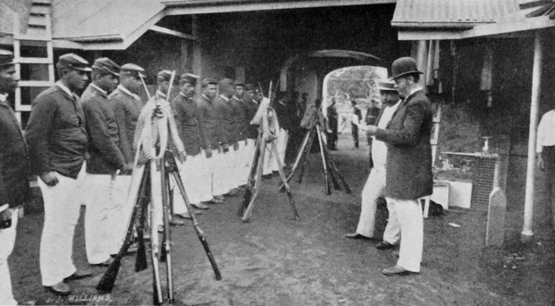
DISBANDMENT OF THE ROYAL HOUSEHOLD GUARD
The Wilcox (reform) cabinet came next. They were appointed by stratagem, as I found out afterwards. The policy of this cabinet was retrenchment, no changes in the monetary system of the country, and to make a commercial treaty which would bring us in closer relationship with the United States.
Their first policy they failed to carry out, as they went into all sorts of extravagant measures, such as $5,000 for sending a commission to Washington – and that commission was to consist of Thurston, Wilcox, and others – with the purpose of annexing these Islands; $12,000 to send the band to Chicago, and $50,000 for the Volcano road. All these measures were for Mr. Thurston's private benefit, but were passed in the House. It had always been customary for the ministry to consult the king or sovereign in cabinet council on any measure of importance; but in this instance, and on all occasions, the cabinet had already decided on those measures, and simply presented them to me for my signature. I had no resource but to acquiesce. Whenever I expostulated their answer was generally, "We have consulted the chief justice, and are of one opinion." I found that I was simply a nonentity, a figurehead, but was content to wait patiently until the next session, when probably they would be voted out.
It required diplomacy to overthrow the Wilcox cabinet, and the liberals used it. The cabinet felt secure because those who worked amongst the members as wire-pullers were so sanguine about their success; but where corruption is practised there is no stability, and such it proved in this instance. A short time before the overthrow of the Wilcox cabinet, Cummins, Bush, R. W. Wilcox, Ashford, and their followers, finding that their hopes of being in the cabinet would never be realized, left, and turned to help the liberals once more, and with the aid of some of the nationals they were successful. These members had been deceived by the Thurston party, and they now combined to help the liberals.
Mr. White was the introducer of the bill providing for a constitutional convention; also the opium and lottery bills. He watched his opportunity, and railroaded the last two bills through the House; but he failed in regard to the first bill. A vote of want of confidence was then brought in. The liberals won; and the cabinet was voted out, partly because they were so sure of their success and on account of their own corrupt practices.
The next day Messrs. Parker, Cornwell, Colburn, and Peterson were appointed. These gentlemen were accepted by the majority of the people in the House, who applauded them on their entrance, because they were men of liberal views, although they were not considered representative men, because they were not backed by moneyed men. The same day of their appointment they advised me to sign the opium and lottery bills. I first declined, as I wanted to please my lady friends; but they said there should be no hesitation on my part, as the House had passed those bills by a large majority, and they had been signed by the president and committee. I had no option but to sign. It took place on the 13th of January, 1893.
During the month of November, 1892, a private note was sent me informing me of the intentions of the American minister, J. L. Stevens, with the aid of some of our residents, to perfect a scheme of annexation, and that the cabinet had knowledge of the fact; but I gave little heed to it at the time. On the 17th of December, 1892, another note was received, of which the following is a copy:
HER MAJESTY QUEEN LILIUOKALANI.
May it please Your Majesty:
Madam, – Referring to the confidential communication I took the liberty of addressing Your Majesty a few weeks ago, about the attitude and utterances of the American representatives here, the perfect correctness of which have been confirmed by subsequent information, I now beg to be allowed to state, that through the same trustworthy source I have been informed that in a very late moment of effusion, some American official gave to understand that he had instructions to press and hurry up an annexation scheme, which he confidently expected to carry through at no distant date, with the help and assistance of the present cabinet.
If Your Majesty will kindly weigh this information by the side of the bold open declarations and annexation campaign made at the present time in the Bulletin by the Rev. Sereno Bishop, the well-known mouthpiece of the annexation party, I think that Your Majesty will be able to draw conclusions for yourself, and realize that there is not only danger ahead, but that the enemy is in the household, and that the strictest watch ought to be kept on the members of the present cabinet.
This again in strictest confidence from
Your majesty's humble and faithful servant,
—
This was written by a gentleman in whose word I have great confidence as a man who had the best interest of Hawaii at Heart. It was on the receipt of this note that I sent for the British commissioner, James H. Wodehouse, and asked his advice on the matter. I asked whether he thought it would be wise for me to invite all the foreign representatives of the diplomatic and consular corps, fearing that a disturbance might arise over the political situation. He said that he should not interfere with our local matters, and he dissuaded me from the idea, as he said it was like acknowledging that there was actual danger; and asked, "Did I think there was any danger?" I answered, "There might be."
The morning of the 14th of January, 1893, arrived with all preparations for the closing of the legislature. At 10 A.M. I called a cabinet meeting for the purpose of apprising them of their positions in the House, and other preliminary instructions. I told them it was my intention to promulgate a new constitution. The cabinet had to meet the legislature, and we adjourned. At 12 M. I prorogued the legislature. I noticed that the hall was not filled as at the opening. There were many ladies present in the audience, and I also noticed that several members of the legislature belonging to the reform party were not there. This looked ominous of some coming trouble.
On entering the palace I saw Mr. Wilson at the entrance of the Blue Room. I went up to him, and asked if it was all ready. He replied, "Yes." Then I said, "You will have to be brave to-day;" and I passed into the Blue Room, and sat awaiting my ministers. A half-hour passed, and they did not come. After a little longer delay they arrived. I immediately judged from their countenances that something was wrong. I had a few days before planned that I would sign the constitution in the throne-room and in the presence of the members of the legislature, the majority of whom had been elected by the people for the purpose of working for a new constitution.
At the commencement of my reign petitions were sent from all parts of the kingdom asking for a new constitution. Mr. Iosepa of Hani, Kauhi of Ewa, Nahinu of Molokai, Kanealii of Waihee, Kamauoha of Kohala, and other members came to me repeatedly, and asked for a new constitution. Mr. Parker, from the commencement of his ministry, advocated a new constitution, as well as most of my friends, but I was cautious in my answers to them; but to Mr. Parker I had always said it would be a good thing, and he said he would sustain me when the proper opportunity arrived.
A month later I met two members of the legislature, and started to make up a new constitution from Kamehameha V.'s and that of 1887. After completing it, I kept it until the month of October, when I placed it in the hands of Mr. A. P. Peterson, and asked him to correct it, and if he found any defects to strike them out, and to put in such clauses as he thought would be good for the people and for the country. He took it, and kept it a whole month. To my knowledge he consulted many lawyers and others in regard to many points of interest in the document. When it was returned I looked it over and found no changes had been made, so I concluded that it was all right. A week before the closing of the legislature I asked Mr. Peterson to make a preamble for my new constitution, but up to the day of prorogation he had not made one.
Early in January I mentioned to Captain Nowlein of the Household Guards, and Mr. Wilson the marshal, my intention to promulgate a new constitution, and to prepare themselves to quell any riot or outbreak from the opposition. They assured me they would be ready; and I gave strict injunctions of secrecy, and showed Mr. Wilson a plan of the throne-room on the day of the signing. Mr. Parker and Mr. Cornwell had given me assurances of their support before their appointment as ministers, while Mr. Peterson understood that such was my intention, and although I had not mentioned it to Mr. Colburn, he had heard of it already from Mr. Peterson. It appears that immediately on their learning of my intentions, Mr. Colburn, on the morning of the 14th of January, immediately acted the part of a traitor, by going to Mr. Hartwell, a lawyer, and informing him of my intentions, and of course received instructions from him to strongly advise me to abandon the idea.
This, then, was the cause of the delay and my long waiting in the Blue Room. The members of the diplomatic corps had been invited, also the members of the supreme bench and members of the legislature, besides a committee of the Hui Kalaiaina. The latter were invited to be present because it was through them that many petitions had been sent to me. When the ministers arrived I told them everything in the throne-room was ready, and the guests were awaiting our presence; that we must not keep them waiting. I was surprised when the cabinet informed me that they did not think it advisable for me to take such a step, that there was danger of an uprising, etc. I told them I would not have taken such a step if they had not encouraged me. They had led me out to the edge of a precipice, and now were leaving me to take the step alone. It was humiliating. I said, "Why not give the people the constitution, and I will bear the brunt of all the blame afterwards." Mr. Peterson said, "We have not read the constitution." I told him he had had it in his possession a whole month.
The three ministers left Mr. Parker to try to dissuade me from my purpose; and in the meantime they all (Peterson, Cornwell, and Colburn) went to the government building to inform Thurston and his part of the stand I took. Of course they were instructed not to yield. When they went over everything was peaceful and quiet, and the guests waiting patiently in the throne-room. The ministers returned, and I asked them to read the constitution over. At the end I asked them what they saw injurious in the document. Mr. Peterson said there were some points which he thought were not exactly suited. He begged that I should wait for two weeks; in the meantime they would be ready to present it to me. With these assurances I yielded, and we adjourned to the throne-room.
I state to the guests present my reasons for inviting their presence. It was to promulgate a new constitution at the request of my people; that the constitution of 1887 was imperfect and full of defects. Turning to the chief justice, I asked, "Is it not so, Mr. Judd?" and he answered in the affirmative, in the presence of all the members assembled.
I then informed the people assembled that under the advice of my ministers I had yielded, as they had promised that on some future day I could give them a new constitution. I then asked them to return to their homes and keep the peace. Everything seemed quiet until Monday morning. Even if any great commotion had been going on I would have remained indifferent; the reaction was a great strain, and all that took place after that I accepted as a matter of course. It was the disappointment in my ministry.
At about ten A.M., Monday, the 16th of January, notice was issued by my ministers, stating "that the position I took and the attempt I made to promulgate a new constitution was at the earnest solicitation of my people – of my native subjects." They gave assurances that any changes desired in fundamental law of the land would be sought only by methods provided in the constitution itself, and signed by myself and ministers. It was intended to reassure the people that they might continue to maintain order and peace.
At about five P.M., however, the troops from the United States ship Boston were landed, by the order of the United States minister, J. L. Stevens, in secret understanding with the revolutionary party, whose names are L. A. Thurston, Henry Waterhouse, W. R. Castle, W. O. Smith, A. F. Judd, P. C. Jones, W. C. Wilder, S. B. Dole, Cecil Brown, S. M. Damon, C. Bolte, John Emmeluth, J. H. Soper, C. L. Carter. Why had they landed when everything was at peace? I was told that it was for the safety of American citizens and the protection of their interests. Then, why had they not gone to the residences, instead of drawing in line in front of the palace gates, with guns pointed at us, and when I was living with my people in the palace?
Tuesday morning, at nine o'clock, Mr. S. M. Damon called at the palace. He told me that he had been asked to join a revolutionary council, but that he had declined. He asked me what he should do, and whether he should join the advisory or executive council, suggesting that perhaps he could be of service to me; so I told him to join the advisory council. I had no idea that they intended to establish a new government.
At about two-thirty P.M., Tuesday, the establishment of the Provisional Government was proclaimed; and nearly fifteen minutes later Mr. J. S. Walker came and told me "that he had come on a painful duty, that the opposition party had requested that I should abdicate." I told him that I had no idea of doing so, but that I would like to see Mr. Neumann. Half an hour later he returned with that gentleman, and I explained to him my position, and he advised that I should consult my friends. I immediately sent for Messrs. J. O. Carter, Damon, Widemann, Cleghorn, my ministers; Messrs. Neumann, Walker, and Macfarlane also being present. The situation being taken into consideration, it was found that, since the troops of the United States had been landed to support the revolutionists, by the order of the American minister, it would be impossible for us to make any resistance.
Mr. Damon had previously intimated to Mr. Parker that it was useless to resist, their party was supported by the American minister. Mr. Damon also said at the meeting that it was to be understood that I should remain at the palace, and continue to fly the royal standard. At six P.M. I signed the following protest: –
I, Liliuokalani, by the grace of God and under the constitution of the Hawaiian kingdom Queen, do hereby solemnly protest against any and all acts done against myself and the constitutional government of the Hawaiian kingdom by certain persons claiming to have established a Provisional Government of and for this kingdom.
That I yield to the superior force of the United States of America, whose Minister Plenipotentiary, His Excellency John L. Stevens, has caused United States troops to be landed at Honolulu, and declared that he would support the said Provisional Government.
Now, to avoid any collision of armed forces, and perhaps the loss of life I do, under this protest and impelled by said forces, yield my authority until such time as the Government of the United States shall, upon the facts being presented to it, undo (?) the action of its representative, and reinstate me in the authority which I claim as the constitutional sovereign of the Hawaiian Islands.
Done at Honolulu this seventeenth day of January, A.D. 1893.
| (Signed) | LILIUOKALANI R. | |
| (Signed) | SAMUEL PARKER, | |
| Minister of Foreign Affairs. | ||
| (Signed) | WM. H. CORNWELL, | |
| Minister of Finance. | ||
| (Signed) | JOHN F. COLBURN, | |
| Minister of Interior. | ||
| (Signed) | A. P. PETERSON, | |
| Attorney-General. |
(Addressed)
To S. B. DOLE, Esq., and others composing the Provisional Government of the Hawaiian Islands.
A letter was sent to the marshal of the kingdom requesting him to deliver everything to the Provisional Government.
All that night and next day everything remained quiet.
At ten A.M., the 18th, I moved to Washington Place of my own accord, preferring to live in retirement.
On the 19th of January, I wrote a letter to President Harrison, making an appeal that justice should be done.
HIS EXCELLENCY BENJAMIN HARRISON,
President of the United States:
My great and good Friend, – It is with deep regret that I address you on this occasion. Some of my subjects, aided by aliens, have renounced their loyalty, and revolted against the constitutional government of my kingdom. They have attempted to depose me, and establish a Provisional Government in direct conflict with the organic law of this kingdom. Upon receiving incontestable proofs that His Excellency the Minister Plenipotentiary of the United States had caused troops to be landed for that purpose, I submitted to force, believing that he would not have acted in that manner unless by authority of the government which he represents.
This action on my part was prompted by three reasons, the futility of a conflict with the United States, the desire to avoid violence and bloodshed and the destruction of life and property, and the certainty which I feel that you and your government will right whatever wrongs may have been inflicted upon us in the premises. In due time a statement of the true facts relating to this matter will be laid before you, and I live in the hope that you will judge uprightly and justly between myself and my enemies.
This appeal is not made for myself personally, but for my people, who have hitherto always enjoyed the friendship and protection of the United States.
My opponents have taken the only vessel which could be obtained here for the purpose; and hearing of their intention to send a delegation of their number to present their side of the conflict before you, I requested the favor of sending by the same vessel an envoy to you to lay before you my statement as the facts appear to myself and my loyal subjects.
This request has been refused; and I now ask you, in justice to myself and to my people, that no steps be taken by the Government of the United States until my cause can be heard by you. I shall be able to despatch an envoy about the second day of February, as that will be the first available opportunity hence; and he will reach you with every possible haste, that there may be no delay in the settlement of this matter.
I pray you, therefore, my good friend, that you will not allow any conclusions to be reached by you until my envoy arrives.
I beg to assure you of the continuation of my highest consideration.
(Signed) LILIUOKALANI R.
It appears that President Harrison could not have taken notice of my appeal; for the 16th of February I find he sent a message to the Senate transmitting the treaty, with a view of its ratification, without having first investigated or inquired into all the conditions or points of our situation, or that of the United States itself. I will not attempt to write the President's message, as you are already aware of its text.
I also wrote a letter to Mr. Cleveland.
GROVER CLEVELAND,
President-elect of the United States.
My great and good Friend, – In the vicissitudes which happened in the Hawaiian Islands, and which affect my people, myself, and my house so seriously, I feel comforted the more that, besides the friendly relation of the United States, I have the boon of your personal friendship and good will.
The changes which occurred here need not be stated in this letter. You will have, at the time at which it reaches you, the official information; but I have instructed the Hon. Paul Neumann, whom I have appointed my representative at Washington, to submit to you a prècis of the facts and circumstances relating to the revolution in Honolulu, and to supplement it by such statements as you may please to elicit.
I beg that you will consider this matter, in which there is so much involved for my people, and that you will give us your friendly assistance in granting redress for a wrong which we claim has been done to us, under color of the assistance of the naval forces, of the United States, in a friendly port. Believe me that I do not veil under this request to you anything the fulfilment of which could in the slightest degree be contrary to your position; and I leave our grievance in your hands, confident that, in so far as you deem it proper, we shall have your sympathy and your aid.
I am, your good friend,
LILIUOKALANI R.
On the 31st of January the Hon. Paul Neumann received his appointment as envoy extraordinary and minister plenipotentiary to the United States of America. On the 1st of February he departed for Washington, with Prince David Kawanauakoa to accompany him on his commission, to negotiate for a withdrawal of the treaty, and to restore to us what had been taken away by the actions of the revolutionists. At my request Mr. E. C. Macfarlane kindly consented to accompany the commission.
Happily Providence ordered otherwise than as was expected by the revolutionists. Man proposes and God disposes. My commissioners arrived in time to stay the progress to the treaty. The members of the Senate became doubtful as to the correctness of the actions of the commissioners of the Provisional Government.
President Harrison's term expired. President Cleveland's first act has been to withdraw that annexation treaty; the second, to send a commissioner to investigate the situation in Hawaii Nei.
Your arrival in this country has brought relief to our people and your presence safety. There is no doubt but that the Provisional Government would have carried out extreme measures toward myself and my people, as you may have already seen ere this, by their unjust actions. If the President had been indifferent to my petitions, I am certain in would have brought serious results to myself and tyranny to my subjects. In this I recognize the high sense of justice and honor in the person who is ruler of the American nation.
In making out this lengthy statement I will present the main points: –
(1) That it has been a project of many years on the part of the missionary element that their children might some day be rulers over these Islands, and have the control and power in their own hands, as was the case after the revolution of 1887. Mr. W. W. Hall openly stated that they had planned for this for twelve years. It was a long-thought-of project, a dream of many years. So also said Mr. F. S. Lyman of Hilo, in his speech to the people in the month of January. He said, "Fifteen long years we have prayed for this, and now our prayers are heard."
The disposition of those appointed to positions of authority, to act with the missionary element, tends to make the government unstable; and because they found I could not easily be led by them, they do not like me.
(2) The interference of the American minister, J. L. Stevens, in our local affairs, and conspiring with a few foreign people to overthrow me and annex these Islands to the United States, and by his action, has placed me and my people in this unhappy position.
(3) My attempt to promulgate a new constitution. It was in answer to the prayers and petitions of my people. They had sent petitions to the late king, and to the legislature ever since 1887.
The legislature is the proper course by which a new constitution or any amendments to the constitution could be made; that is the law. But when members are bribed and the legislature corrupted, how can one depend on any good measure being carried by the House? It is simply impossible. That method was tried and failed. There was only one recourse; and that was, that with the signature of one of the cabinet I could make a new constitution.
There is no clause in the constitution of 1887, to which I took my oath to maintain, stating "that there should be no other constitution but this;" and article 78 reads that –
"Wheresoever by this constitution any act is to be done or performed by the king or sovereign it shall, unless otherwise expressed, mean that such act shall be done and performed by the sovereign by and with the advice and consent of the cabinet."
The last clause of the forty-first article of the constitution reads: –
"No acts of the king shall have any effect unless it be countersigned by a member of the cabinet, who by that signature makes himself responsible."
My cabinet encouraged me, then afterwards advised me to the contrary. In yielding to their protest I claim I have not committed any unconstitutional or revolutionary act; and having withdrawn, why should the reform party have gone on making preparations for war, as they did?
(4) That on the afternoon of the 16th of January, at five P.M., the United States troops were landed to support the conspirators, by orders of the United States minister, J. L. Stevens.
That on Tuesday, the 17th of January, 1893, at about two thirty o'clock P.M., the Provisional Government was proclaimed, and Minister Stevens assured my cabinet that he recognized that Government; and that at six P.M. of the same day I yielded my authority to the superior force of the United States.
We have been waiting patiently, and will still wait, until such time as the Government of the United States, on the facts presented to it, shall undo the act of its representative.
I hope and pray that the United States and her President will see that justice is done to my people and to myself; that they will not recognize the treaty of annexation, and that it may forever be laid aside; that they will restore to me and my nation all the rights that have been taken away by the action of her minister; that we may be permitted to continue to maintain our independent stand amongst the civilized nations of the world as in years gone by; that your great nation will continue those kind and friendly relations that have always existed for many years past between the two countries. I can assure you that Hawaii and her people have no other sentiment toward American and her President than one of the kindest regard.
The provisional Government, instead of being under the guidance of the president and cabinet, as the responsible heads of the nation, are virtually led by irresponsible people, who compose the advisory councils and "provisional army," and who set the laws of the land at defiance. A continuation of this state of things I consider dangerous to life and to the community.
I pray, therefore, that this unsatisfactory state of things may not continue, and that we may not suffer further waste, that justice may be speedily granted, and that peace and quiet may once more reign over our land, Hawaii Nei.
LILIUOKALANI.
FACTS AS TO SUBMISSION OF HAWAIIAN QUESTION TO THE DECISION OF THE UNITED STATES.
By HER MAJESTY LILIUOKALANI, with the approval of the Provisional Government.
| Date of so-called | S. B. Dole, S. M. Damon, and some |
| Revolution, | twenty or thirty others sent for J. O. Carter |
| TUESDAY, | to be of committee to be sent to palace to |
| Jan. 17, 1893. | assist her in making any protest she desired |
| about 6 P.M. | to make against her deposition; he joined |
| J. O. C. being | the party, headed by Mr. Damon, and ad- |
| "Queen's Councillor" | vised Her Majesty that any demonstration |
| and still faithful. | on the part of her forces would precipitate |
| Page 1330. | a conflict with the forces of the United |
| States; that it was desirable that such a | |
| conflict be avoided; that her case would be | |
| considered at Washington, and a peaceful | |
| submission to force on her part would greatly | |
| help her case. Mr. Damon had previously | |
| informed Her Majesty of her deposition, and | |
| Page 1317. | that she might prepare a protest. Mr. Da- |
| mon in his sworn statement says, "I did | |
| tell her that she would have a perfect right | |
| to be heard at a later period by the United | |
| Page 1674. | States Government. I was there as a mem- |
| Also | ber of the Provisional Government." Mr. |
| "Alexander's | Damon personally called on the queen at |
| History," Oct. 1896. | nine o'clock that forenoon and told her that |
| Page 54. | he had decided to join the Provisional Gov- |
| ernment, and further that he was its first | |
| vice-president. He remains its minister of | |
| finance to the present date. The Provis- | |
| Page 1318. | ional Government had been recognized at |
| this time. The protest says, "I yield to the | |
| superior force of the United States of Amer- | |
| ica – until such time as the Government of | |
| the Unites States shall , upon the facts being | |
| presented to it, undo the action of its repre- | |
| sentatives, and reinstate me in the authority | |
| Page 1394. | which I claim as the constitutional sovereign |
| of the Hawaiian Islands." Mr. Damon and | |
| the Cabinet returned to the Provisional Gov- | |
| ernment and presented the protest; and Pres- | |
| ident Dole indorsed on the same, "Received | |
| by the hands of the late Cabinet this seven- | |
| Page 1399. | teenth day of January, A.D. 1893." After |
| this protest, the queen surrendered her arse- | |
| nal. The letter sent by the same steamer | |
| Page 1027. | on which (January 18) the annexation com- |
| missioners sailed (the queen having been re- | |
| fused the privilege of placing one representa- | |
| tive on board), says to President Harrison, | |
| received at | "This action on my part was prompted by |
| Executive office, | three reasons: The futility of a conflict with |
| Feb. 3, 1893. | the United States; the desire to avoid vio- |
| lence, bloodshed, and the destruction of life | |
| and property; and the certainty which I | |
| feel that you and your government will right | |
| whatever wrongs may have been inflicted on | |
| us in the premises." |
THE TEXT OF THE TREATY.
How the Cession of the Islands is to be Accomplished.
THE full text of the treaty is as follows: –
The United States and the republic of Hawaii, in view of the natural dependence of the Hawaiian Islands upon the United States, of their geographical proximity thereto, of the preponderant share acquired by the United States and its citizens in the industries and trade of said islands, and of the expressed desire of the government of the republic of Hawaii that those islands should be incorporated into the United States as an integral part thereof and under its sovereignty, have determined to accomplish by treaty an object so important to their mutual and permanent welfare.
To this end, the high contracting parties have conferred full powers and authority upon the irrespectively appointed plenipotentiaries, to wit: –
The President of the United States, John Sherman, Secretary of State of the United States; the President of the republic of Hawaii, Francis March Hatch, Lorrin A. Thurston, and William A. Kinney.
ARTICLE II.
The republic of Hawaii hereby cedes absolutely and without reserve to the United States of America all rights of sovereignty of whatsoever kind in and over the Hawaiian Islands and their dependencies; and it is agreed that all territory of and appertaining to the republic of Hawaii is hereby annexed to the United States of America, under the name of the Territory of Hawaii.
The republic of Hawaii also cedes and hereby transfers to the United States the absolute fee and ownership of all public government, or crown lands, public buildings or edifices, ports, harbors, military equipments, and all other public property of every kind and description belonging to the government of the Hawaiian Islands, together with every right and appurtenance thereunto appertaining.
The existing laws of the United States relative to public lands shall not apply to such lands in the Hawaiian Islands; but the Congress of the United States shall enact special laws for their management and disposition; provided, that all revenue from or proceeds of the same, except as regards such parts thereof as may be used or occupied for the civil, military, or naval purposes of the United States, or may be assigned for the use of the local government, shall be used solely for the benefit of the inhabitants of the Hawaiian Islands for educational and other public purposes.
ARTICLE III.
Until Congress shall provide for the government of such islands, all the civil, judicial, and military powers exercised by the officers of the existing government in said islands shall be vested in such person or persons and shall be exercised in such manner as the President of the United States shall direct, and the President shall have power to remove said officers and fill the vacancies so occasioned.
The existing treaties of the Hawaiian Islands with foreign nations shall forthwith cease and determine, being replaced by such treaties as may exist, or as may be hereafter concluded between the United States and such foreign nations. The municipal legislation of the Hawaiian Islands, not enacted for the fulfilment of the treaties so extinguished, and not inconsistent with this treaty nor contrary to the Constitution of the United States, nor to any existing treaty of the United States, shall remain in force until the Congress of the United States shall otherwise determine.
Until legislation shall be enacted extending the United States customs, laws, and regulations to the Hawaiian Islands, the existing customs relations of the Hawaiian Islands with the United States and other countries shall remain unchanged.
ARTICLE IV.
The public debt of the republic of Hawaii, lawfully existing at the date of the exchange of the ratifications of the treaty, including the amounts due to depositors in the Hawaiian Postal Savings Bank, is hereby assumed by the government of the United States; but the liability of the United States in this regard shall in no case exceed $4,000,000. So long, however, as the existing government and the present commercial relations of the Hawaiian Islands are continued, as hereinbefore provided, said government shall continue to pay the interest on said debt.
ARTICLE V.
There shall be no further immigration of Chinese into the Hawaiian islands, except upon such conditions as are now or may hereafter he allowed by the laws of the United States, and no Chinese, by reason of anything herein contained, shall be allowed to enter the United States from the Hawaiian Islands.
ARTICLE VI.
The President shall appoint five commissioners, at least two of whom shall be residents of the Hawaiian Islands, who shall, as soon as reasonably practicable, recommend to Congress such legislation for the Territory of Hawaii as they shall deem necessary or proper.
ARTICLE VII.
This treaty shall be ratified by the President of the United States, by and with the advice and consent of the Senate, on the one part; and by the President of the republic of Hawaii, by and with the advice and consent of the Senate, in accordance with the Constitution of said republic, on the other; and the ratifications hereof shall be exchanged at Washington as soon as possible.
In witness whereof, the respective plenipotentiaries have signed the above articles and have hereunto affixed their seals.
Done in duplicate at the city of Washington, this 16th day of June, 1897.
JOHN SHERMAN, (Seal)
FRANCIS MARCH HATCH, (Seal)
LORRIN A. THURSTON, (Seal)
WILLIAM A. KINNEY, (Seal)
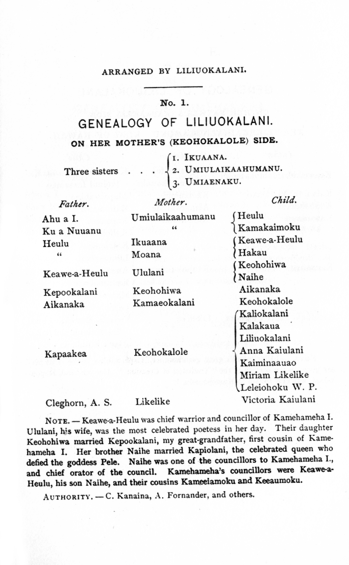
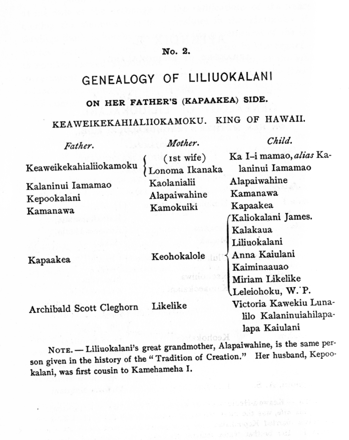

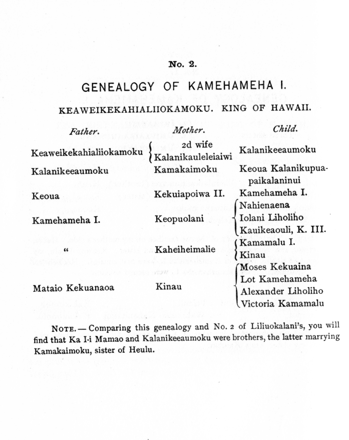
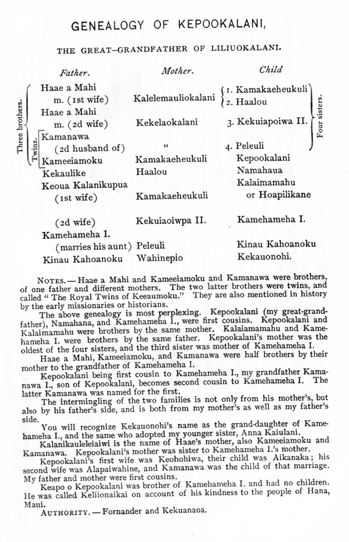
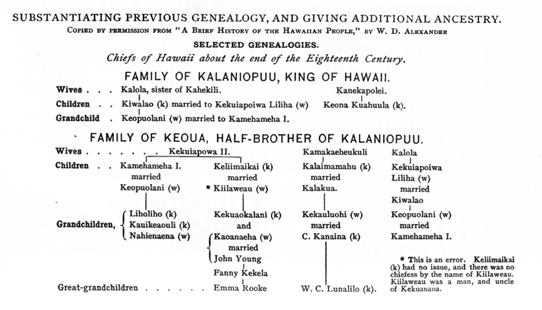
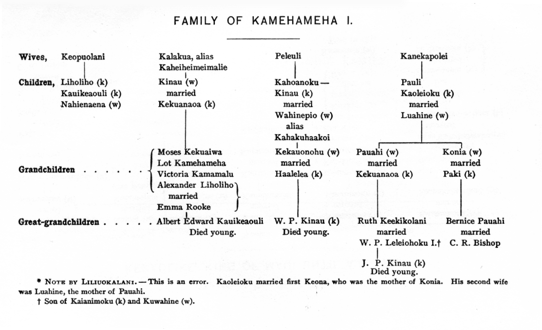
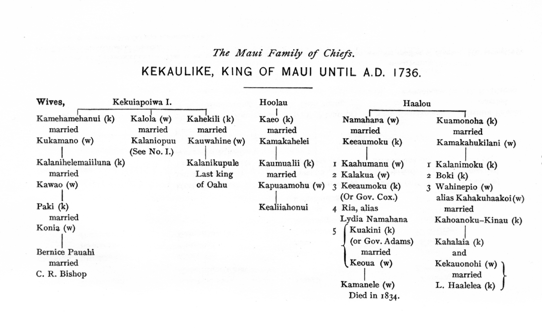
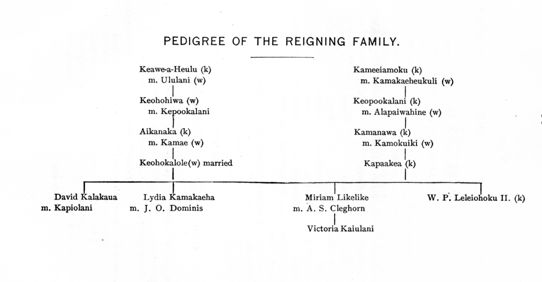
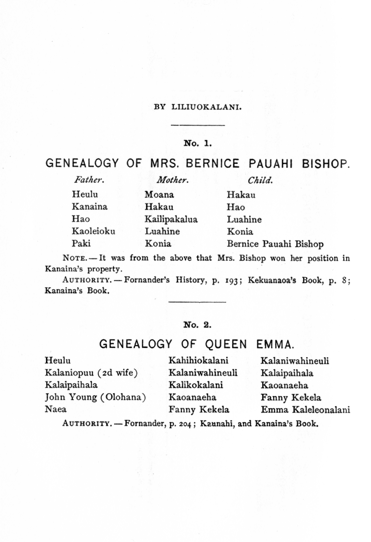
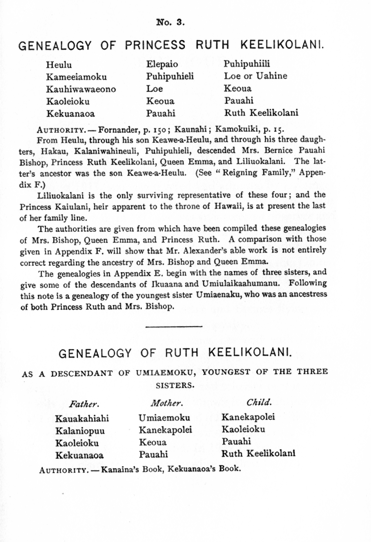
This chapter has been put on-line as part of the
BUILD-A-BOOK Initiative at the
Celebration of Women Writers.
Initial text entry and proof-reading of this chapter were the work of volunteer
Liz Goodman, Sally Drake, and Mary Mark Ockerbloom.